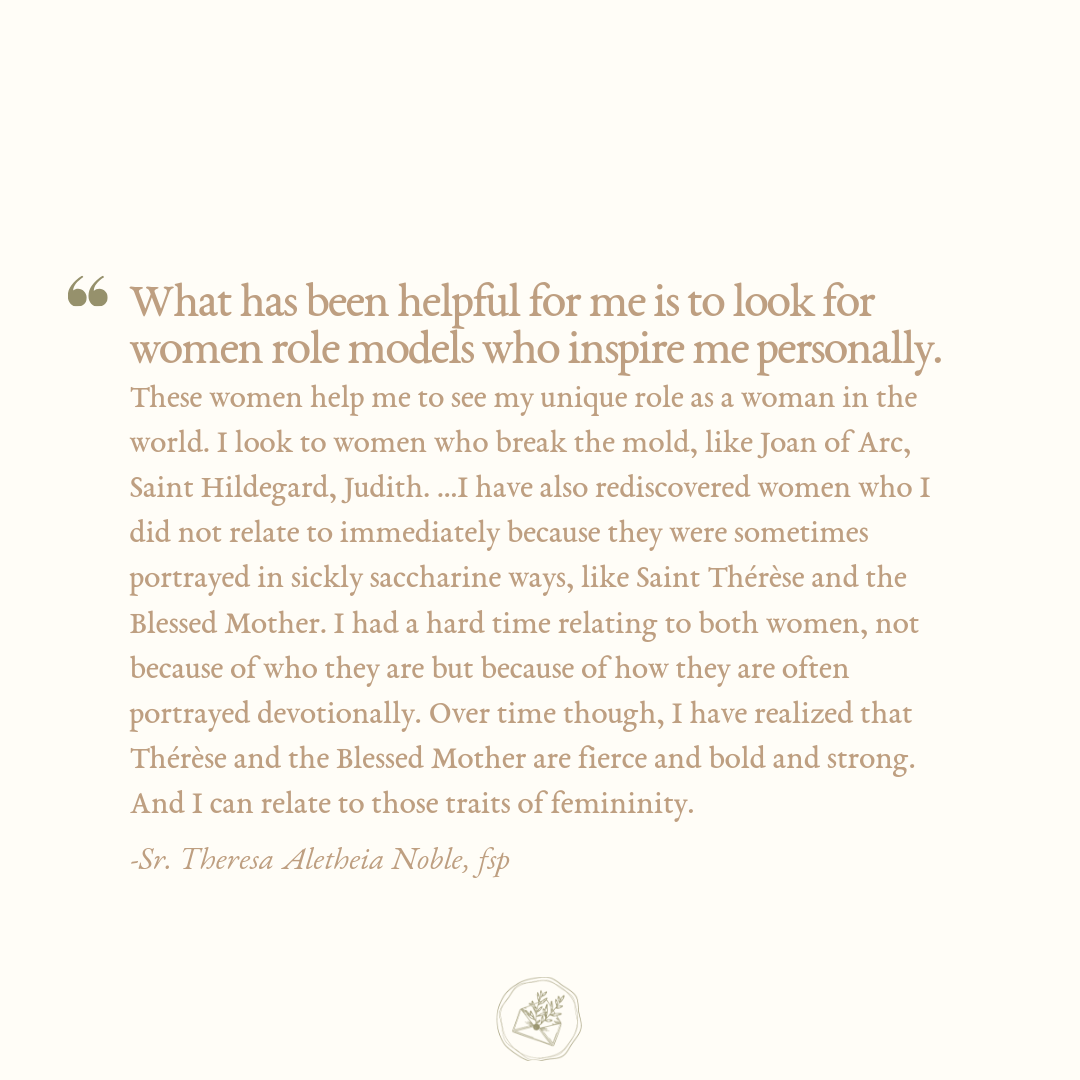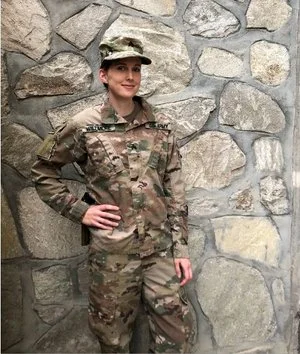No Woman is Only Woman: Distilling the Feminine Genius from Stereotypes
Our interview with Sister Theresa Aletheia, fsp on grappling with the feminine genius and the stereotypes often associated with it, and being a Catholic woman in the world today.
How do you define the feminine genius?
To be honest, I struggle with the concept of a “feminine genius.” I don’t disagree with the idea. I definitely believe women make unique contributions to family and society, but I also think the Church has a long way to go in communicating the implications of this reality. What does it really mean to be a woman in today’s world? What does it mean to be a man? The Church seems to be in the process of articulating answers to these questions in light of today’s gender-related issues.
For me personally, I have gained insight from reading Edith Stein’s Essays on Women. She has a balanced view both of the unique role of women and the equality of women that appeals to me. For instance, in support of the need for women in many societal roles, she writes, “Only subjective delusion could deny that women are capable of practicing vocations other than that of spouse and mother.” And later she writes, “No woman is only woman.” I think her points are important to remember in conversations about what it means to be a woman in today’s world. What makes us unique is not something that boxes us in but something that frees us to respond to the needs of the family, the Church, and the world in our own unique ways. Each woman has something different to offer. And a woman’s gifts are communicated through who she is metaphysically, emotionally, and spiritually as a woman. A woman’s femininity is not incidental, but neither is it completely defining.
I recently watched Bird Box, the popular Netflix movie starring Sandra Bullock. While I was watching it, I thought that the difference between genders often reveals itself in the dystopian novels and movies especially popular today. The Quiet Place is another dystopian movie that reveals the difference between genders not in stereotypes but in concrete, profound ways. In these movies, men and women are fighting for survival and caring for one another in similar ways, but also in very different ways. The ways men act differ from women not in superficial things, like their clothes or job titles, but in how they act. We see gender in how people reveal themselves or do not reveal themselves through their bodies, especially when they reveal themselves as self gift to one another. Both men and women are called to boldly and fiercely protect, nurture, and love others—but the way they do this differs according to who they are both biologically and spiritually.
Drawing from your experience as a religious sister, what does the feminine genius look like in your current day-to-day life?
I am a religious sister with the Daughters of Saint Paul. We are women religious who are called to spread the Gospel using the most modern means of communication. We run a publishing house, Pauline Books and Media. And we also have a strong presence online. Our sisters are communicators of the Gospel, but we do our work in the Church in a way that differs from how men might present the Gospel. We are mothers. We bring a maternal, feminine presence to all we do. But this does not mean that we are soft, submissive, or sentimental. We are bold, passionate, and firm—just like Saint Paul. But we do it in a motherly way. It’s difficult to articulate exactly what that means, it’s more something that needs to be experienced. But if a person follows us online, he or she most likely will see it right away.
Describe a moment from your time as a sister when your genius as a woman has been evident to you.
When I was asked by my sisters to write my book The Prodigal You Love: Inviting Loved Ones Back to the Church, I was intimidated at first. The book’s purpose is to help people to invite their loved ones back to the Church and I knew that it would require a motherly voice. I had been away from the Church, so I knew what people like me needed to hear from their loved ones. But I also was a young novice at the time and I wondered if people would listen to what I had to say. I believe wholeheartedly that the Holy Spirit helped me to step into my role as a spiritual mother in order to write that book. I needed to, or it would not have been helpful to others! I think the voice of a woman was a particularly valuable contribution in this area because women know more instinctively how to reach out to those who are far from God. Women often have the gifts of patience, intuition, and persevering love when it comes to the people we want to draw closer to God. I believe that my perspective as a woman, perhaps even more than my perspective as a former atheist, is what made the book unique and helpful to people.
How would you describe the relationship between your genius as a woman and your vocation?
The ideal of femininity is something that can be discouraging, especially because it can be mixed up in other things that are not really part of the ideal. There’s a section I really relate to in Edith Stein’s Essays on Women when she talks about religious life. She speaks about how women religious, just like all women, are called to nurture and fulfill their femininity in their role as a religious. However, that does not always happen. She writes, “Even were we to look behind cloistered walls, we might discover that the average nun does not measure up to the ideal.”
For me, I am growing into and maturing in who I am every day. And sometimes that means realizing that who I am as a woman, and as a woman religious, is not always what other people might expect. It is through union with God and prayer that I discover who I really am. In the Letter to the Ephesians, there is a great passage that describes this growing in maturity in the spiritual life: “The gifts [God] gave were that some would be apostles, some prophets, some evangelists, some pastors and teachers, to equip the saints for the work of ministry, for building up the body of Christ, until all of us come to the unity of the faith and of the knowledge of the Son of God, to maturity, to the measure of the full stature of Christ” (4:11). The feminine genius is not something that I live completely and perfectly now but something that I am maturing in. I discover who I am in community and in prayer, in my unique calling.
What advice would you pass along to the millennial Catholic woman who wouldn’t consider herself what’s culturally defined as “feminine” and may be skeptical of the notion of the feminine genius?
I definitely do not fall under the typical stereotype of a woman. I never have. (A brief look at my social media presence is enough to verify that!) When I was young I hated wearing dresses and skirts (ironically that’s all I wear now). I liked running around barefoot, getting stung by bees, and riding my bike. As a teenager, I liked punk rock and moshing. But I never considered myself a tomboy nor was I called that by others. I was not acting in any way like a boy. I was acting like a girl, just not in the conventional way. So, I still find it difficult to relate to descriptions of the stereotypical “role of women” and even some of the mysterious definitions you see of the “feminine genius.” Of course, true feminine genius differs from stereotypes, but it often gets wrapped up in these things and it can be difficult to tease out. (I am sure there are other women out there who can relate to what I am saying.)
What has been helpful for me is to look for women role models who inspire me personally. These women help me to see my unique role as a woman in the world. I look to women who break the mold, like Joan of Arc, Saint Hildegard, Judith. (If you are not familiar with her Scripture story in the Book of Judith, look it up!) I have also rediscovered women who I did not relate to immediately because they were sometimes portrayed in sickly saccharine ways, like Saint Thérèse and the Blessed Mother. I had a hard time relating to both women, not because of who they are but because of how they are often portrayed devotionally. Over time though, I have realized that Thérèse and the Blessed Mother are fierce and bold and strong. And I can relate to those traits of femininity.







